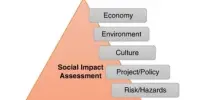Girls as young as six years old develop beliefs that they are less interested in computer science and engineering than boys. These stereotypes can persist until late adolescence, contributing to a gender gap in STEM college courses and related occupations.
A new study from the University of Houston and the University of Washington, published in the Proceedings of the National Academy of Sciences the week of Nov. 22, investigates the gender-based assumptions that young children and teens have about their interest in STEM subjects. According to the report, the majority of children feel that girls are less interested in computer science and engineering than boys.
The study of computers and computational systems is known as computer science. Artificial intelligence, computer systems and networks, security, database systems, human-computer interaction, vision and graphics, numerical analysis, programming languages, software engineering, bioinformatics, and computing theory are all major fields of study in Computer Science.
“Gender-interest stereotypes that STEM is for boys begins in grade school, and by the time they reach high school, many girls have made their decision not to pursue degrees in computer science and engineering because they feel they don’t belong,” said Allison Master, an assistant professor of Psychological, Health and Learning Sciences at the University of Houston and the study’s lead author.
The PNAS study used a combination of surveys and controlled experiments to capture the attitudes of a racially diverse group of children and teenagers in grades 1 through 12.
Researchers intended to investigate how gender-based stereotypes about who enjoys not simply who is “excellent” at computer science and engineering can affect a child’s sense of belonging and willingness to participate, building on previous research of ability stereotypes.
According to studies, such information can have a long-term impact on a young person’s motivation and may dissuade them from trying a new activity or enrolling in a class.
Women are underrepresented in some popular and profitable STEM occupations, according to national statistics as recently as 2019. According to the US Census Bureau, just around 25% of computer scientists and 15% of engineers are women.
Researchers polled almost 2,200 children and teens in the first two investigations to measure their attitudes toward computer science and engineering. The questionnaires utilized concepts and phrases that the students were already familiar with from school, such as “computer coding” for computer science and “planning and developing huge structures such as highways and bridges” for engineering.
Gender-interest stereotypes that STEM is for boys begins in grade school, and by the time they reach high school, many girls have made their decision not to pursue degrees in computer science and engineering because they feel they don’t belong.
Allison Master
Researchers discovered that slightly over half of youngsters (51%) believe that girls are less interested in computer science than boys, and nearly two-thirds (63%) feel that girls are less interested in engineering. In contrast, 14% of youngsters claimed that girls are more interested in computer science than boys, and 9% said that girls are more interested in engineering.
Following lab investigations, a smaller group of children were given the option of choosing between two alternative activities. The findings showed that when girls were told boys were more interested in a computer science activity than females (35 percent of girls chose the activity), they were significantly less interested in it than when they were old boys and girls were equally interested in it (65 percent of girls chose that activity).
While the surveys showed the pervasiveness of gender-based stereotypes around interest in computer science and engineering, the designed experiments demonstrated how stereotypes can affect a sense of belonging, which can influence motivation, co-author Andrew Meltzoff said.
“The large surveys told us that the kids had absorbed the cultural stereotype that girls are less interested in computer science and engineering. In the experiments we zeroed in on causal mechanisms and consequences of stereotypes,” said Meltzoff, a professor of psychology at the UW and co-director of the Institute for Learning & Brain Sciences.
“We discovered that labeling activity in a stereotyped way influenced children’s interest in it and their willingness to take it home the mere presence of the stereotype influenced kids in dramatic ways. This brought home to us the pernicious effect of stereotypes on children and teens.”
And that’s crucial, said Sapna Cheryan, a UW psychology professor, because if girls don’t feel like they belong, they’re less likely to pursue computer science or engineering in school and beyond. This can exacerbate income gaps between men and women in STEM industries.
“Current gender disparities in computer science and engineering careers are troubling because these careers are lucrative, high status, and influence so many aspects of our daily lives. The dearth of gender and racial diversity in these fields may be one of the reasons why many products and services have had negative consequences for women and people of color,” Cheryan said.
Teachers and parents may assist break down preconceptions by encouraging females to participate in high-quality computer science and engineering activities beginning in elementary school, according to the authors.
















